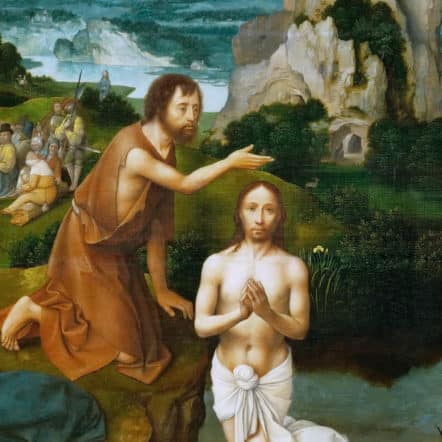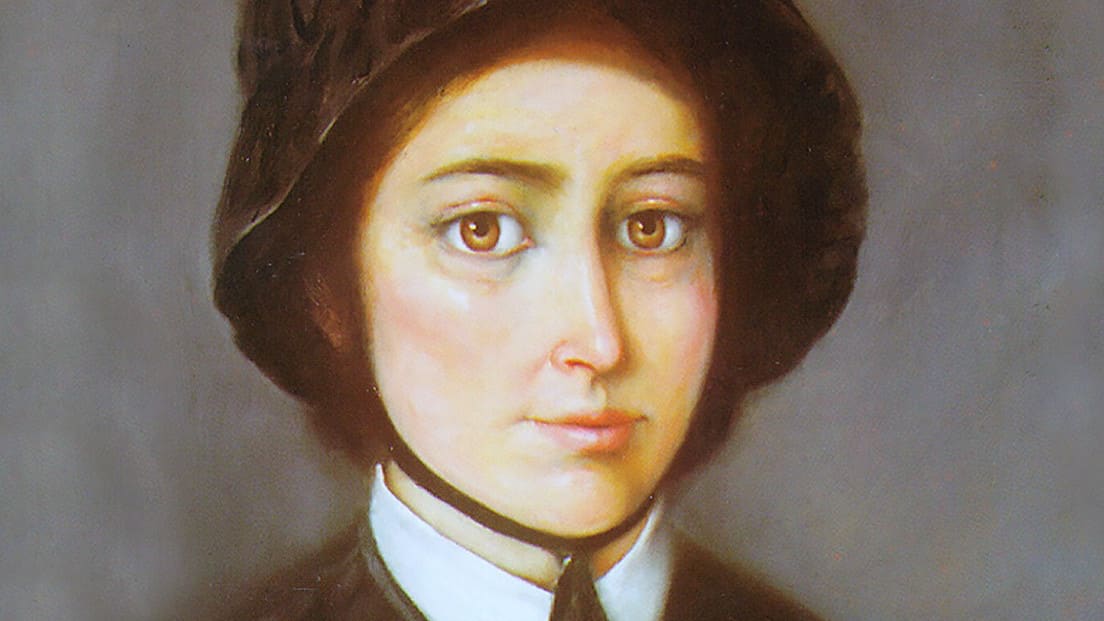Modern technology has developed amazing and, alas, at times also unsettling ways of identifying individuals by whatever is unique to each one, such as fingerprints, eye pupils and facial traits. However, when it comes to Baptism, there is no outward sign to tell a disciple of Christ apart from any other person. On an airplane, a bus, in a stadium, even in a church, there is no way of telling who is a Christian and who is not.
Such is the lofty and mysterious realm of God’s calling.
Our readings for The Baptism of the Lord set us on the unfamiliar path of grace. In human affairs we can wear a uniform or anything else, set by convention, to tell all those interested that we are a firefighter, a police officer, a repairperson or a waitress. Not so with Baptism.
This is what God wishes to tell us today. Everything to do with divine grace is granted us only through Jesus Christ.
In the Gospel (Luke 3:15-16, 21-22) narrative, the heaven that separated us mortal, sinful people from God was opened to indicate that, in the Son Jesus, the Father was opening His Home to anyone humble enough to welcome His forgiveness and love. Furthermore, the time of God’s unbearable silence has ended, and we are spoken the Word of infinite love and infinite mercy:
“You are my beloved Son; with you I am well pleased.”
Salvation, forgiveness, reconciliation, access to God’s two Tables (of the Word and Sacrament) and family membership are all undeserved gifts in the Son and through the Son.
Anything to do with Baptism and membership in God’s family is freely given. It is never the result of our will to grab, to attain, or to merit. That stark fact can be stated also differently: there is nothing that we could have done to rend the sky open and to force God to break His silence.
God’s grace precedes anything good we do. And God’s grace must be given all the credit for our positive responses to the Father’s entreaties. If it is so between our God and us, the only way we can please the Father is by remaining in the Son. This is the core of our Baptism: throughout our entire life, day in and day out, around the clock, we are to be Christ-like. And the only way that the Father can look at us and say: “You are my beloved Son (or Daughter); with you I am well please,” is if, through grace, we acquire the very attitude of Christ.
Thus, the only mark that identifies us as Christians is to be found in our heart. And that mark consists of humility, meekness, and willingness to serve. These traits are the exact opposite of original sin which was basically pride and self-centeredness.
These divine traits are rather visible in the first reading: “This is my servant whom I uphold, my chosen one with whom I am pleased,….A bruised reed he shall not break, and a smoldering wick he shall not quench.” (Isaiah 42:1-4, 6-7)
These traits are also visible in Jesus as he lines up with scores of sinners to receive the baptism of repentance from John. We ought to be impressed by Jesus’ humility. He is numbered among the wicked not because he has any sin, but because he is never ashamed to be the Head of a sin-infested and sin-wrecked Body.
My dear friends in Christ, due to the consequences of original sin, with the exception of the Blessed Mother, there is something disordered in every single one of us: for example, there are times when we think of ourselves as being better than many, many others. There are times when we cannot come up with too many sins to confess to the priest. Actually, we might consider ourselves very good people and, thus, our sorrow could be short-lived and shallow. Out of false humility, we might say that we are sinners, but God forbid that someone might expose any of our flaws or mistakes! Then, our true mettle would show.
Let me remind us of the stark facts of life: For the just man falls seven times [a day]… (Proverbs 24:16)
Clearly, then, if we hope that the Father would recognize us as His, and be pleased with us, we must implore Him to grant us true humility. Without humility we cannot live up to the demands of our Baptism. We might, actually, reach the point of being spiritually mistaken about our real condition. We could be blind to our sins. Thus, we would be totally incapable of feeling compassion for others and interact with acceptance and openness. We might wind up being upset by acceptable behavior or take issue with perfectly reasonable ideas. Hence, we might be eager to correct, change, judge and, perhaps, even condemn a good number of people.
Now, if we still have a hard time convincing ourselves of our sinfulness, let us try this: let us picture, today, what will be revealed on Judgment Day. Let us picture people’s reaction to our secret outbursts of pride, jealousy, anger, greed, lust, gluttony, and sloth. What if they were to learn, today, about our cases of duplicity and half-truths, or about what we really think of certain people?
Don’t you feel what I feel inside? Don’t you sense embarrassment covering your face already as I sense mine being covered by embarrassment? Perhaps, then, our most fitting way of celebrating the gift of Baptism is by heeding Paul’s message to the Philippians and to us:
If there is any encouragement in Christ, any solace in love, any participation in the Spirit, any compassion and mercy, complete my joy by being of the same mind, with the same love, united in heart, thinking one thing. Do nothing out of selfishness or out of vainglory; rather, humbly regard others as more important than yourselves, each looking out not for his own interests, but (also) everyone for those of others. Have among yourselves the same attitude that is also yours in Christ Jesus. (Philippians. 2:1-5)
Amen!








